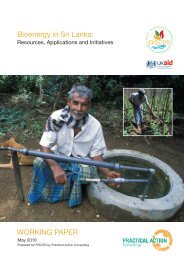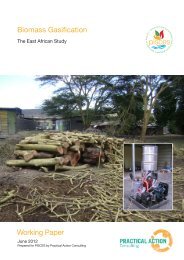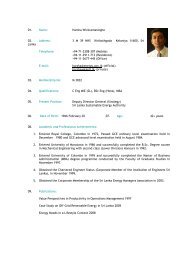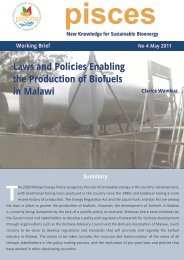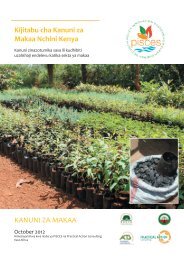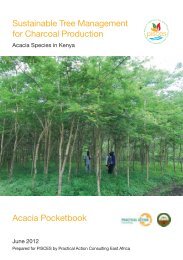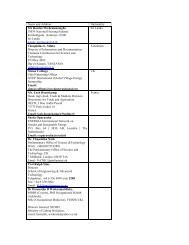Liquid Biofuels Strategies and Policies in selected African ... - Pisces
Liquid Biofuels Strategies and Policies in selected African ... - Pisces
Liquid Biofuels Strategies and Policies in selected African ... - Pisces
Create successful ePaper yourself
Turn your PDF publications into a flip-book with our unique Google optimized e-Paper software.
The Government adopted the National Energy Policy <strong>and</strong> the Renewable EnergyDevelopment Strategy <strong>in</strong> 2006, <strong>and</strong> the National Biofuel Development Strategy <strong>in</strong>2009. The strategy is expected to <strong>in</strong>crease national energy production through thedevelopment of biofuels. Mali has been home to early development small-scalejatropha research <strong>and</strong> pilot studies, engag<strong>in</strong>g <strong>and</strong> teach<strong>in</strong>g small-holder farmers. WithDutch <strong>in</strong>put, Mali Biocaburant has piloted models of farmer <strong>in</strong>clusion along the l<strong>in</strong>es ofProkon <strong>and</strong> Diligent <strong>in</strong> Tanzania. The rural-based organisation ULSPP (Local jatrophaProducers Union) has been the lead<strong>in</strong>g organisation for the production of Jatropha <strong>in</strong>the region s<strong>in</strong>ce 2007. The union consists of 12 producer cooperatives, represent<strong>in</strong>ga total of 2,500 members, <strong>in</strong>clud<strong>in</strong>g 500 women, <strong>and</strong> the jatropha production areacovers over 3,600 hectares (SNV 2010).4.2.8 MozambiqueIn March 2007, The Forum of Energy M<strong>in</strong>isters of Africa (FEMA) adopted the MaputoDeclaration emphasis<strong>in</strong>g the imperative <strong>and</strong> urgent need to accelerate the diversificationof Africa’s energy matrix. Mozambique’s government then carried out a biofuelsevaluation <strong>in</strong> 2007, focused on technical, socio-economical <strong>and</strong> environmentalfeasibility, <strong>in</strong>clud<strong>in</strong>g crop selection; prelim<strong>in</strong>ary legislation; <strong>and</strong> mapp<strong>in</strong>g <strong>and</strong> zon<strong>in</strong>g of11 million hectares of l<strong>and</strong> potentially suitable for biofuels production with a focus onsugarcane <strong>and</strong> sorghum, jatropha <strong>and</strong> coconut palm. They then conducted sem<strong>in</strong>arswith civil society, pass<strong>in</strong>g the result<strong>in</strong>g <strong>Biofuels</strong> policy <strong>and</strong> Strategy <strong>in</strong>to law <strong>in</strong> May2009. The policy upholds pr<strong>in</strong>ciples of <strong>in</strong>clusiveness, transparency, environmental <strong>and</strong>social protection, <strong>in</strong>strumentalism, fiscal susta<strong>in</strong>ability <strong>and</strong> <strong>in</strong>novation. Specifically, thestrategy is an <strong>in</strong>strument that focuses on the promotion of ethanol (sugarcane <strong>and</strong> sweetsorghum) <strong>and</strong> biodiesel (jatropha <strong>and</strong> coconut) for the production of liquid fuels to beused ma<strong>in</strong>ly <strong>in</strong> transport, as well as for other energy purposes.Accord<strong>in</strong>g to this document, biofuels development <strong>in</strong> Mozambique will be focus on:• <strong>Biofuels</strong> as an essential activity for the private sector developed along public-privatepartnerships.• Encouragement of <strong>in</strong>ternational cooperation through the strengthen<strong>in</strong>g of exist<strong>in</strong>gl<strong>in</strong>ks between <strong>in</strong>stitutions.• Strengthen<strong>in</strong>g of cooperation with development partners, tak<strong>in</strong>g <strong>in</strong>to considerationthe grow<strong>in</strong>g diversity.• Between south-south <strong>and</strong> north-south l<strong>in</strong>ks.• Strengthen<strong>in</strong>g the implementation of mechanisms <strong>and</strong> <strong>in</strong>struments of the KyotoProtocol to encourage the rapid development of production <strong>and</strong> use of biofuels,contribut<strong>in</strong>g to an effective reduction of emission levels of greenhouse gases.The Action Plan of this strategy identifies the follow<strong>in</strong>g actions for biofuelsdevelopment <strong>in</strong> Mozambique.Dem<strong>and</strong> for biofuels:3 Establish appropriate mechanisms to secure the development of the country’sbiofuels <strong>in</strong>dustry.3 Prepare legislation to alter the TSC taxation modules.3 Prepare legislation on co-generation of electricity.3 Prepare the criteria for susta<strong>in</strong>able biofuels production.3 Contribute to the establishment of a regional agreement between the SADC countries.Opportunities for <strong>Biofuels</strong>:3 Establish programs for technical cooperation between partners.3 Adopt mechanisms to secure the availability of biofuels based on the provisionswith<strong>in</strong> the gradual <strong>in</strong>troduction plan.Price fix<strong>in</strong>g mechanisms:3 Develop an operational manual for the bids of the program for purchase of biofuels(PCB).3 Develop a method for price fixation for the PCB reference.3 Manage the social/environmental impacts <strong>and</strong> develop susta<strong>in</strong>ability criteria.Institution framework:3 Create a national biofuels commission.3 Establish a national program for biofuels development (PNDB).3 Establish a program for purchase of biofuels (PCB).3 Prepare credential criteria for the certification of service providers.3 Formation of social capital.3 Support <strong>and</strong> establish entities for certification of service providers.3 Develop biofuels quality norms.3 Develop specifications for the importation of flex-fuel vehicles.On 29 March 2011, the Council of M<strong>in</strong>isters approved the Regulation on BiofuelMixtures, as well as establish<strong>in</strong>g the Inter-m<strong>in</strong>isterial Biofuel Commission, headed upby the m<strong>in</strong>istries for Energy <strong>and</strong> Agriculture. These <strong>in</strong>struments were set up to promotethe domestic biofuel market, its supervision <strong>and</strong> coord<strong>in</strong>ation. The Governmentexpects these regulations to establish conditions for the <strong>in</strong>troduction of mixtures of 90percent gasol<strong>in</strong>e with 10 percent ethanol <strong>and</strong> 97 percent fossil diesel with 3 percentbiodiesel (Macauhub, 2011)With much potential <strong>in</strong> the bioethanol field, <strong>in</strong> late December 2009, the Governmentrevoked ProCana’s 30,000 hectare sugarcane/ethanol concession <strong>in</strong> Mass<strong>in</strong>girDistrict, a company bought by the British-backed Bioenergy Africa <strong>in</strong> 2008. Thecompany changed to m<strong>in</strong><strong>in</strong>g <strong>and</strong> exploration, renam<strong>in</strong>g itself as Sable m<strong>in</strong><strong>in</strong>g. Theproject <strong>in</strong> the driest areas was set to displace 38,000 people already displaced fromthe Transborder Peace Park. Mozambique’s communal l<strong>and</strong> law gives its <strong>in</strong>habitants astrong say <strong>in</strong> the use of their l<strong>and</strong>, but is not be<strong>in</strong>g put <strong>in</strong>to full practice <strong>and</strong> they’re notbe<strong>in</strong>g given their voice. With more detailed mapp<strong>in</strong>g <strong>and</strong> zon<strong>in</strong>g of the realities on theground, full participation <strong>in</strong> decision mak<strong>in</strong>g, appropriate feedstocks, adequate earlyregulatory frameworks <strong>and</strong> strong <strong>in</strong>vestment from Brazil <strong>and</strong> others, Mozambiquemay emerge as one of the strong players <strong>in</strong> <strong>African</strong> biofuels- particularly <strong>in</strong> bioethanol.Some growers have moved towards sett<strong>in</strong>g their own susta<strong>in</strong>ability criteria for jatropha(Partners for Innovation, 2010). EcoEnergia, previously Sekab, strongly supportedby Brazilian commerical fund<strong>in</strong>g, plans 400,000 hectares of sugarcane betweenMorogoro <strong>and</strong> Rifiji <strong>in</strong> Tanzania <strong>and</strong> <strong>in</strong>l<strong>and</strong> from Pemba <strong>in</strong> Mozambique.38 <strong>Liquid</strong> <strong>Biofuels</strong> <strong>Strategies</strong> <strong>and</strong> <strong>Policies</strong> <strong>in</strong> <strong>selected</strong> <strong>African</strong> Countries <strong>Liquid</strong> <strong>Biofuels</strong> <strong>Strategies</strong> <strong>and</strong> <strong>Policies</strong> <strong>in</strong> <strong>selected</strong> <strong>African</strong> Countries 39



